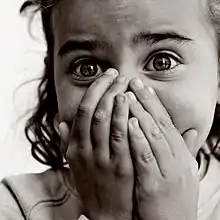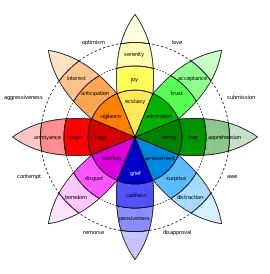Anxiety
Anxiety is distress or uneasiness of mind caused by a fear of danger or misfortune.[1] Very often, people with anxiety also feel worries. There can also be physical symptoms, like having a headache or an upset stomach.

Anxiety is a very common human emotion and is often associated with fear, panic, and the fight or flight response.[2] The amount of stress needed to cause anxiety will vary from person to person however, basics include: losing one's job, the death of a loved one, or an accident, to name a few. In most people, anxiety will settle over time and one will return to normal state.[2]
Some people suffer a lot of anxiety over a long period of time which controls them and makes their lives difficult. These conditions are called anxiety disorders and can be treated by therapy and medicine.
General anxiety symptoms are things such as; continual tiredness / exhaustion, inability to relax, lack of confidence, low self-esteem, fear of public places, fear of socialising, frequent feelings of irrational anxiety / fear, compulsive behavior, worrying about making mistakes, regular nightmares, disturbed sleep patterns, excessive crying, headaches, stomach problems, diarrhea, nausea, aching muscles, and so on.
Symptoms of anxiety attacks are things like; sweating, shaking and tremors, palpitations, shortness of breath, hyperventilating, racing heart beat, tingling in hands and feet, feeling of impending doom, feeling you are having a heart attack. There are more, but these are the usual ones.
Medicine
These symptoms, more or less, define anxiety but they can also be signs of other problems, so the first port of call has to be a doctor or other health care professional. They will be able to define what the problem is exactly, and propose the appropriate treatment.
A doctor’s first line treatment is usually through drug-based medication; for example antidepressants, anti-anxiety tablets and beta blockers. These can be very effective, but they all have side effects, some worse than others. This can tend to put folks off continuing with them. Note however, that many drugs that have been taken for a longer time, need to be stopped in a special way (usually, with the help of a doctor); simply stopping the drug can lead to withdrawal symptoms.
Other non-drug therapies are becoming popular such as; self-hypnosis, meditation, yoga, cognitive behavioral therapy, counseling, acupuncture, etc. These are therapies to help people ‘manage’ or ‘cope’ with their anxiety and / or anxiety attacks.
But what about the underlying cause(s) of anxiety? The two treatment types above focus on either reducing the symptoms of anxiety, or, helping a person cope with their disorder. They don’t seem to do anything about the underlying condition(s) that are causing the anxiety.
And the very ‘fear’ of another anxiety attack can bring one on. As long as this irrational fear exists it’s very difficult to stop attacks and resolve the general anxiety. Eliminating this fear can prevent further attacks and get rid of the general anxiety much more effectively.
Anxiety disorders
Anxiety disorders are any sort of disorder caused by a major amount of anxiety. There are many different disorders, each of which may be diagnosed by a trained professional. Examples of such disorders are
Brain-based disorders
- Obsessive-Compulsive Disorder: is when someone is obsessed with intrusive (unwanted) thoughts that cause the person do to certain actions (compulsions) they don't want to do but feel forced to do it otherwise they feel like something bad will happen to them or the thoughts will not go away unless they respond to them by doing rituals.
- Post-Traumatic Stress Disorder: is when someone has a very hard time trying to get over a very scary event that happened to them in the past and when they think of it, causes them anxiety attacks. For example, someone with PTSD has been in a car crash earlier in their lives and avoid driving or riding on cars and instead prefer to walk, take the train, or sometimes ride a bus to feel safe.
Fear of specific things
- Fear of certain animals: Arachnophobia is the fear of spiders
- Fear of certain situations: Agoraphobia is the fear of crowds (and of not being able to get away easily), Acrophobia is the fear of heights
- Fear of bridges: Gephyrophobia is the fear of bridges which people who have it often driving on bridges, or if they are riding as a passenger, will be very anxious if the driver crosses them on a bridge.
- Generalised ones, such as Post-traumatic stress disorder (which occurs in people who have often been exposed to stressful situations, such as wars).
- There are many more that are not listed here. See List of phobias for more.
General
- Generalised Anxiety Disorder is excessive worry about many things.
- Panic Disorder is when a person suffers from random panic attacks, it can often lead to agoraphobia.
Non-medical, religious treatments
The state of anxiety can be calmed with the devotion of the Rosary that allows the person to pray and meditate with a great sense of peace.[3]
Related pages
References
- "Anxiety | Define Anxiety at Dictionary.com". Retrieved 2018-05-05.
- "What Is Generalized Anxiety Disorder?". WebMD. Retrieved 2018-05-05.
- Anastasi, M. W.; Newberg, A. B. (2008). "A preliminary study of the acute effects of religious ritual on anxiety". Journal of Alternative and Complementary Medicine (New York, N.Y.). 14 (2): 163–165. doi:10.1089/acm.2007.0675. PMID 18307389.

